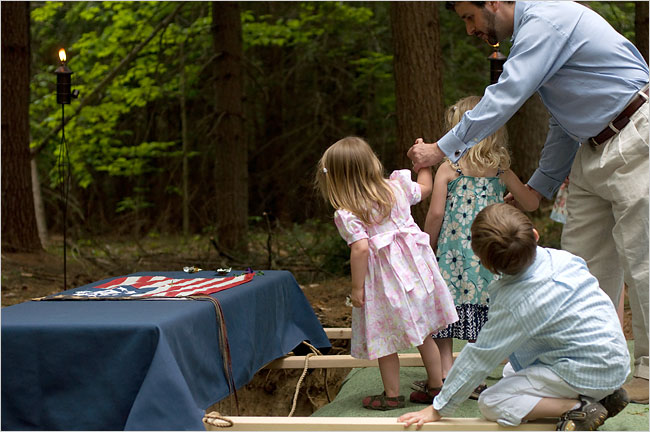What is a home burial?
A home burial is the burial of the deceased on private property often located in rural areas. Home burials offer a hands-on approach to caring for your loved one post death. It is also one of the most economical ways to bury a loved one since you don't have to purchase property in a cemetery or follow cemetery regulations such as having a casket, outer burial container (vault or grave liner), or headstone - this can save you thousands of dollars. Home burials also offer the convenience of being close to home and reduce space-restrictions associated with a family plot in a cemetery. Another bonus is that home burials are inherently green - providing minimal negative impact to the environment. With that in mind, is is even legal to bury your family on your private property?
Can you bury a family member on your property?
Yes, in almost every state it is legal to bury your loved ones on private property as long as it is in a rural or semi-rural area and you have the approval of the local municipality. According to one New York Times article, Home Burials Offer an Intimate Alternative, the number of home burials and home funerals have continued to rise in due part to the intimacy it provides and much lower cost of a home burial. Although there are many advantages to home burials, there are still some areas to consider beforehand such as preparing the body, products for home burial, burial site preparations, selling the property and re- sale value of the property. When looking at the legal aspects of home burials, each state has different laws. There are 3 different scenarios that vary state by state:
- Some states do not mandate any outside involvement in the funeral and burial - you can do it all yourself.
- Some states mandate a funeral director’s involvement, from signing the death certificate to overseeing burial or cremation. These states include Alabama, Connecticut, Illinois, Iowa, Indiana, Louisiana, Michigan, Nebraska, New Jersey, and New York.
- Other states do not allow home burials at all such as California, Indiana, and Washington.
For more information about your specific state see our state by state end-of-life guides or visit Funeral Ethics Org to find out laws in your state (see the burial section for your state).
What should we consider for a home burial?

Preparing the Body for Home Burial
Preparing the body for burial includes washing and clothing the body and placing it in a burial shroud or coffin or casket, if you choose to use one. This is a very intimate process therefore make sure you are ready to take on the task of preparing the body as it can be extremely personal and emotional. Home funeral guides and death doulas can be a great resource for those who would like some assistance in taking care of their own. Other considerations including filing the death certificate and transporting the body to the burial site. Most states require a transportation permit.
Products for Home Burial
A home burial does not require all the expensive products involved with a conventional burial including a casket, outer burial container, or a headstone. If you chose a home burial and desire any of these products you can purchase them from a variety of places. A majority of these products can be purchased online - check Amazon, Walmart, or other independent online retailers. You can also check with your local funeral home, cemetery, or casket store.
Burial Site Preparation
Preparing the burial site includes digging the grave, lining the grave (in some instances), placing the body in the ground, and covering it with dirt. When preparing the site you must follow zoning laws and regulations. Some states have specific requirements for location and distance from landmarks such as bodies of water and hospitals. Another requirement that should be verified is the depth of the grave. Though not typically as deep as cemeteries that require an outer burial container and casket, many local governments require a set distance between the top of the body and the ground surface (3.5 feet is typical in green burials in the USA). Filling permits, such as death certificates, with the state government may be necessary as well in order for the burial to be considered legal.
What Happens to Home Burial Grounds After You Sell Your Property?
According to another NY Times article, Did I Mention the Graves Out Back?, zoning for a burial ground carries certain perpetuity clauses and restrictions so that later landowners know of the cemetery's existence. The deed to the property has to have a restriction placed on it as well, to ensure people will know of the cemetery's existence at a later point in time. New landowners typically don't have the ability to move the body after they purchase the land. Josh Slocum, Executive Director of the Funeral Consumers Alliance, stated in the same NY Times article that, "It is illegal to dismantle cemeteries or remove gravestones. Property owners must go through a lengthy legal process before altering such a site, often requiring that they obtain permission from relatives. Other avenues include seeking a court order to have the graves moved to another cemetery, or trying to deed the land to a municipality so as to shift responsibility for its care." A 1959 Oklahoma case was one of the first cases to deal with a new landowner wanting to move an existing burial site that was located on their new property. The court upheld the permanency created by the family burial ground so the burial site could not be moved.
Re-Sale Value of Properties with Home Burial Grounds
Within the deed to your house you must include a map showing where the burial site is on the land so the new owners know where it is located. Did I Mention the Graves Out Back?, sites some examples of home burial grounds and their affect on resale value. For some buyers, a home burial ground could be a total turnoff. For others, it's all part of the property's history. It's just another point to keep in mind if you are establishing a burial site on your property. If you move or no one in your family takes over your property when you've passed on, then are you comfortable with someone else inhabiting the property and taking care of the graves? Will the new owners embrace this land and care for it or will they let it be overgrown?





